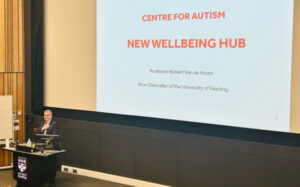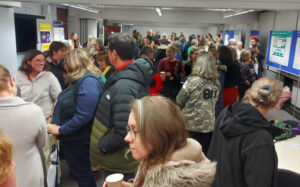The Centre for Autism Wellbeing Hub at the University of Reading launched in November 2023. We explore how it is making a real difference to autistic children and their parents and carers.
 Legacy gifts have played a vital role in the history of the University, helping to shape the world-leading institution we are today. It is thanks to donations made from our alumni and supporter community that the Centre for Autism Wellbeing Hub could be launched and services made available free of charge, or at a very low cost, making a real difference to many people’s lives.
Legacy gifts have played a vital role in the history of the University, helping to shape the world-leading institution we are today. It is thanks to donations made from our alumni and supporter community that the Centre for Autism Wellbeing Hub could be launched and services made available free of charge, or at a very low cost, making a real difference to many people’s lives.
The Wellbeing Hub aims to co-produce and deliver neurodiversity-affirming activities that support autistic young people and their families to live their best lives. During the opening speech of the Hub, Vice-Chancellor Professor Robert Van de Noort noted:
“This initiative has been made possible thanks to funding from the University of Reading and the support of University donors.”
The Hub aims to create an inclusive community in which autistic young people, their families, and supporting professionals can engage in meaningful collaboration focused on supporting autistic young people and their families to lead their best lives.
Plans for the Hub have been developed over the past year in collaboration with autistic young people and their families, via a scoping study to establish how the Wellbeing Hub might best meet their needs. This study also involved consultation with professionals in local education and health services to establish what autism-specific support is currently available and where gaps may exist.
A whole family approach
 Throughout the study, autistic young people shared that they valued autonomy-supporting approaches rooted in understanding and acceptance of their authentic ways of being. In tandem, parents of autistic young people expressed that they needed more guidance in developing the parenting styles their children valued most. This need is most acute in the initial period following an autism diagnosis, but there is still a need for longer-term support.
Throughout the study, autistic young people shared that they valued autonomy-supporting approaches rooted in understanding and acceptance of their authentic ways of being. In tandem, parents of autistic young people expressed that they needed more guidance in developing the parenting styles their children valued most. This need is most acute in the initial period following an autism diagnosis, but there is still a need for longer-term support.
Parents also shared that they needed more guidance in supporting their children’s mental wellbeing, particularly with regards to anxiety.
The Wellbeing Hub plans to meet these needs by developing and piloting a programme which provides neurodiversity-affirming parent support which is personalised, parent-centred and accessible beyond the initial post-diagnostic period. They are also planning an anxiety programme to be delivered to families and education professionals.
For autistic young people, the Hub’s plan is to develop a range of offerings centred on the areas they identify as most meaningful to them. One of these offerings will be a primary focus on understanding their own autistic identity and developing self-advocacy skills, these having been highlighted during the scoping study as a crucial need.
Beyond this, the aim is to continue to work with autistic children and young people to co-develop and co-produce activities which align with their personal priorities.
Training for tomorrow
The Wellbeing Hub is passionate about supporting the professional workforce of the future and is proud to be a training centre of excellence in a range of specialisms which are vital for providing the right types of help.
The Hub will make an important contribution towards the development of future clinicians, educators and researchers who work with autistic people and their families. Student work experience placements will form a key component of the new Hub. It will operate with around 12 MSc students each year, supervised at all times by qualified clinicians and researchers ensuring students receive valuable practical experience.
Find out more about the Centre for Autism Wellbeing Hub.




